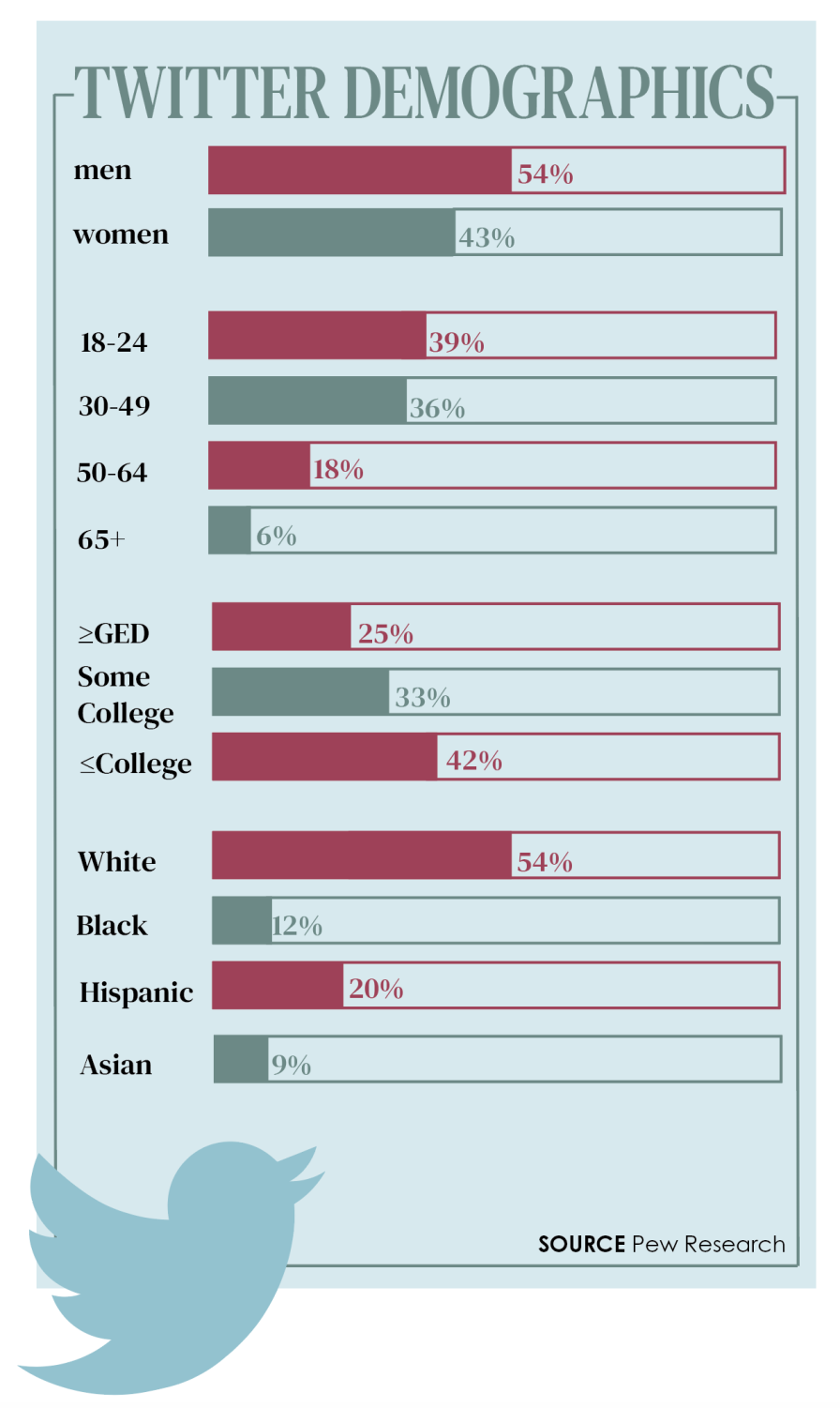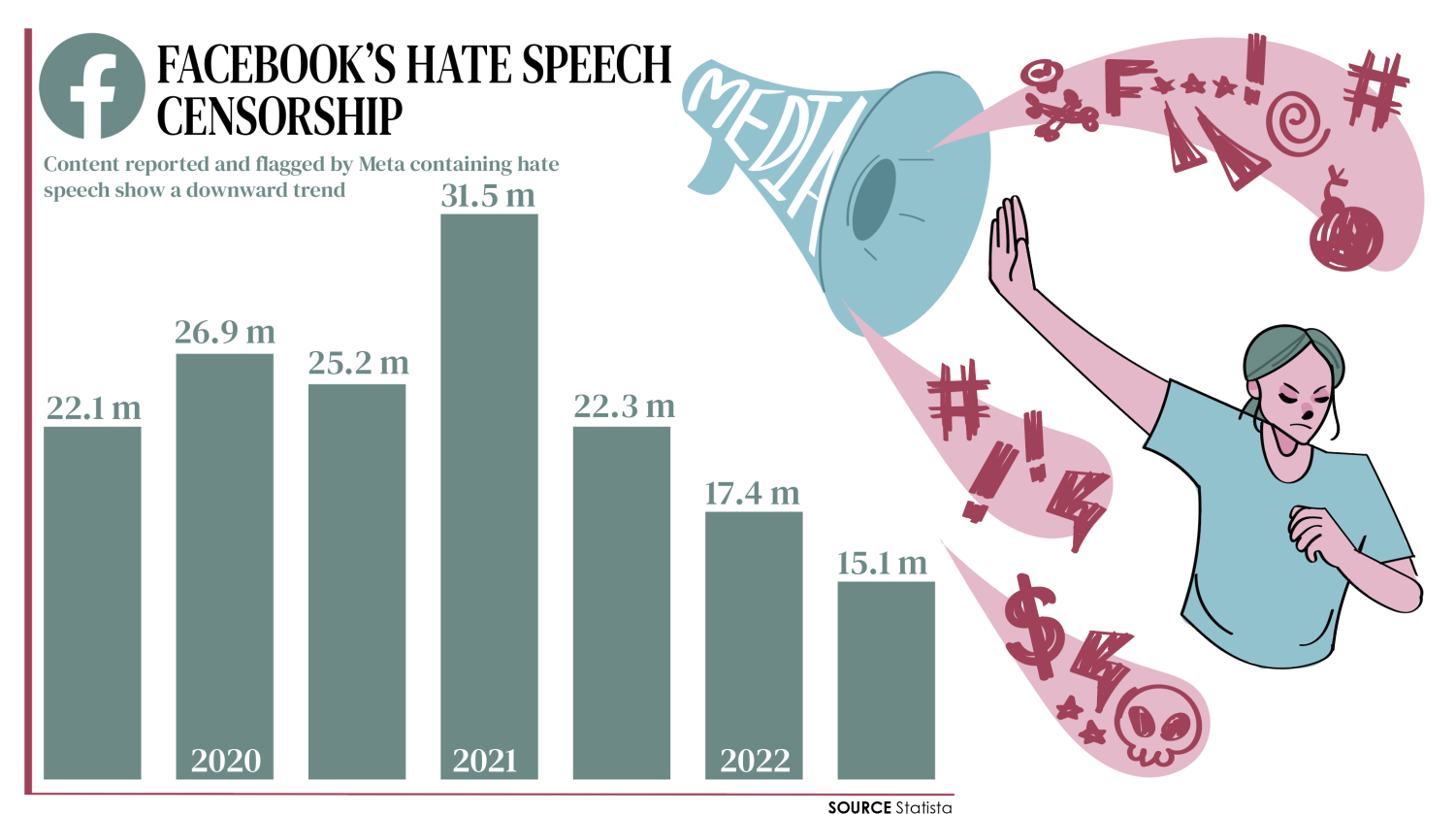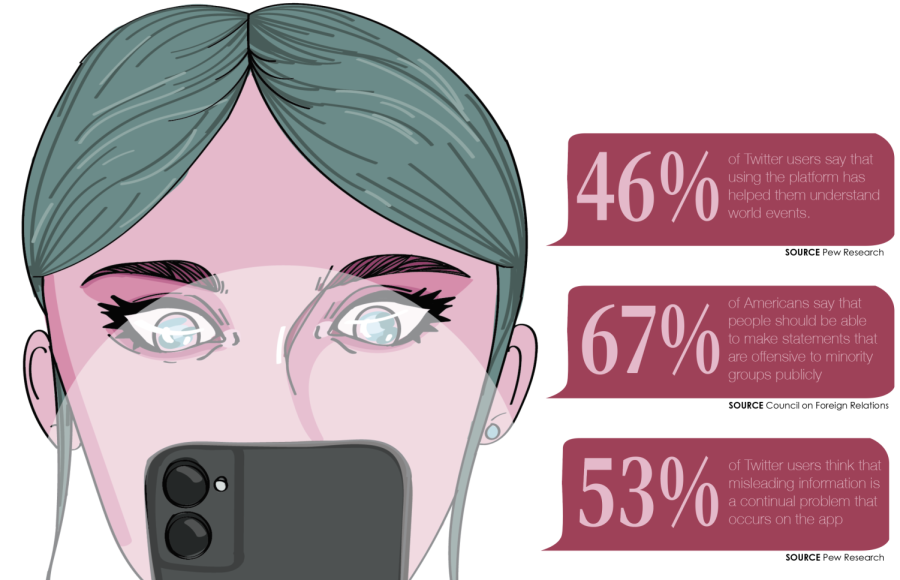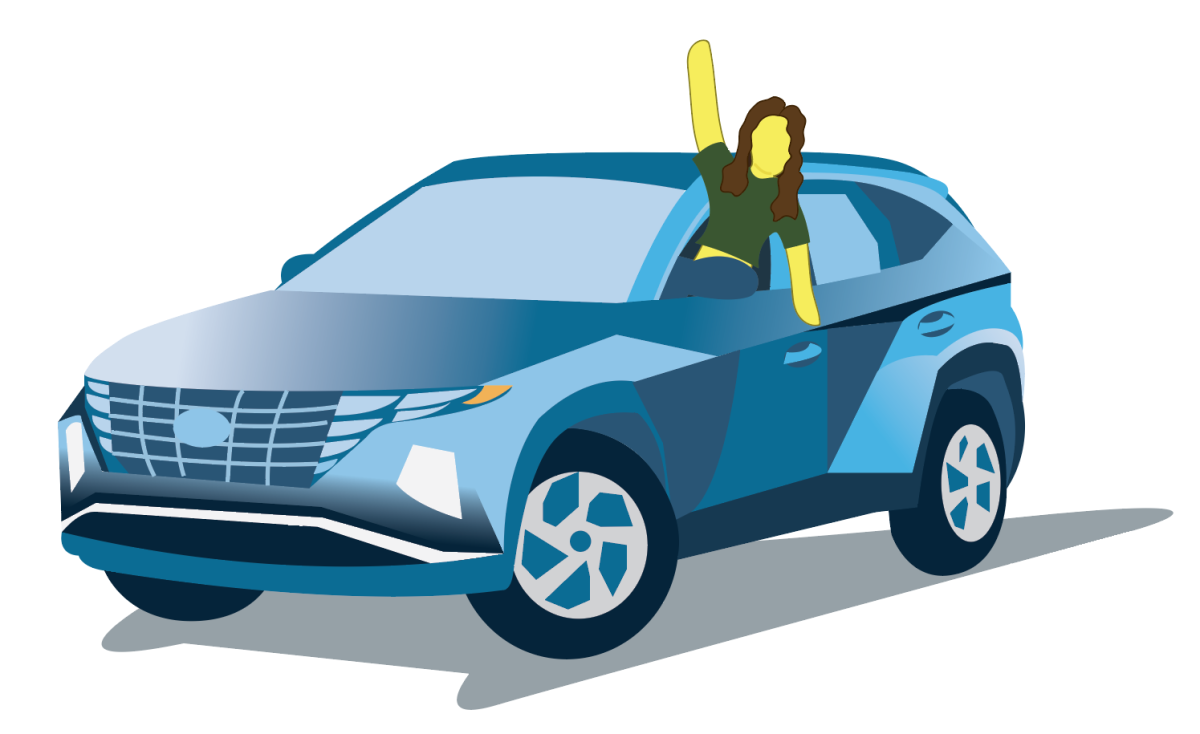Free to speak
Recent activity from celebrities across all platforms on the web are sparking a new debate on what people can and can’t say to millions through a screen.
January 17, 2023

A student just got home from school, they finally throw their backpack off after a long day and decide to open their favorite app, Twitter and the first thing they see is a tweet from Kanye “Ye” West. The student wonders to themselves: “What will he say this time?”
Recent activity from celebrities across all platforms on the web are sparking a new debate on what people can and can’t say to millions through a screen.
THE FIRST AMENDMENT
In today’s world, communication is not limited to the words spoken to one another or the papers stamped in ink, it’s digital. A place where talking to someone without even knowing who they are, or where they are in the world is common. AP World History teacher Carrie Hoffman-Howell reflects on what the First Amendment means in her classroom.
“The First Amendment grants everyone in the United States the basic human rights, such as speech, religion, press, etc, that should be basic rights for all humans on the Earth,” Hoffman-Howell said. “We are fortunate to live in a country that recognizes basic human rights.”
Freedom of speech has been held as a pillar to fostering a fair and equal Democracy. English teacher Jacob Morgan shares how this right has changed since its creation.
“Especially today, freedom of speech has grown to be a hot issue because of the online climate and the way people are utilizing their rights,” Morgan said. “The amount of information we are spreading plays a part in what qualifies as speech, too.”
According to Morgan, teachers listen to what words students say to one another and analyze them to create new ideas based on them. To Morgan, The freedom of speech is the ability to be free from those words being taken away.

“The way people’s biases can build up hysteria is kind of a scary thing as someone who studies the power of language everyday,” Morgan said. “It’s really upsetting and unsettling the way antisemitism and antisemetic language is being shared. We need to right the words that are being used.”
When a person attends a protest or writes to their representatives about any issue, that is an example of them exercising their First Amendment rights. Similarly, sharing a post on social media made by your favorite news outlet is the same exercise.
“I think that in the media it is definitely easier to speak out online because it is less scary,” sophomore Audrey Nixon said. “In real life people aren’t really as confrontational. When you are speaking out online it’s easy to hide behind a screen and say what you want to without any repercussions.”
In such an instantaneous environment, like the Internet with over 198.4 million active websites and over 5.47 billion users according to First Site Guide, it can be an intimidating and lawless place.
“The media has the power to reach everyone quickly and if not careful, they could start a global panic,” Hoffman-Howell said. “For safety reasons, I believe the media needs to report the facts, but not start a widespread panic that could lead to more violence.”
Freedom of speech has been tested by the seemingly limitless social media apps like Facebook and Twitter. Both apps are used for quick exchanges of messages, which may contain photos, videos, links, and to no surprise, instant messaging. This can lead to interesting conversations that may or may not be accepted by the masses. Sagebiel walks through one of the most recent societal rejections with a popular music star, West who has been under fire for antisemitic comments on Twitter.
“The posts he has made are insane,” Sagebiel said. “He’s gone off the rails, and it’s sad because he wasn’t always like this. During Hurricane Katrina, he did say the ‘Bush doesn’t care about Black people’ statements, which was a very left leaning ideal at the time. Yes, I think he has been polarized to the right but I also think that he’s doing all these statements for attention.”
On December 2, West was suspended, for the second time. The first being back on October 9. He was then reinstated by new CEO Elon Musk. Most recently, after posting a design of a swastika inside the Star of David, Musk resuspended West and the post was removed, stating the post violated the app’s rule against inciting violence.
“Right now, I think the media has caught that if your headline mentions Kanye at all, you’re going to get clicks,” Morgan said. “He’s been given a whole lot of attention. As someone who listened to Kanye 10 years ago, I can say that I’m sad to see the way he’s deteriorated and the views that he’s started to adopt.”
ACCOUNTABILITY
In the past month, West’s anti-black and antisemitic comments on multiple television shows, podcasts, and social media platforms have cost him his partnerships with Adidas, Gap, and Balenciaga. The responses from these corporations beg the question: Is this holding him accountable? Where is the line drawn?
“If it gets excessive, rude, derogatory, and it’s anything that could seriously offend someone I think you shouldn’t say that online,” Nixon said. “With social media platforms, I think they can do what they want with what they say because it’s freedom of speech. Everyone has the right to say what they want but it’s difficult to find a line when it’s derogatory.”
Since West’s crusade on Twitter began, he has gained 180,925 new followers since Saturday, December 3, according to Newsweek. Content on his account has ranged from racist comments to music promotion, and with a target audience of 18-24 year-olds, this exposure is questioned.
“I think social media should be monitored to a certain extent because minors have access to these, and many young people/minors might misinterpret things being said on social media,” Hoffman-Howell said. “If something is harmful to anyone, then it shouldn’t be published on social media. Or, if you want full freedom of speech, keep your social media private to not harm anyone.”
As CEO of Twitter, Musk has gotten the final say by suspending West from posting, effectively ending the antisemitic comments on his platform while also removing his right to speak out on Twitter.
“Right now, there’s this mob mentality of when someone does something that the majority disagrees with then everyone should attack that one person,” Sagebiel said. “I think that’s wrong but there’s definitely a way of going around this. So, if someone like Kanye says something outlandish like what he’s been saying about the Jewish community, then you should have those people speak out against it and educate him on how those things are wrong.”
Apps like Pinterest and Etsy are publicly owned domains, which means that they are owned by the government. According to Hoffman-Howell, private social media apps get a say as to what goes on their app because they own it.
“I think that companies which are, like, private businesses have the right to refuse service to anyone,” Sagebiel said. “So, if they think that this person is someone that they don’t want on their platform, they should be allowed to censor it. But in public spaces, I think they shouldn’t be allowed to do that.”
According to Sagebiel, if someone is in a private space, and the owner doesn’t want them there, the owner should be able to exercise that right. On the other hand, if they are in the crowded square and they are shouting something they should be able to say what they want regardless of the content. On apps like Twitter, Facebook, and Instagram, society has taken it upon themselves to “cancel” those who say inappropriate things outcasting them without the aid of suspension.
“Cancel culture mainly lives in social media and I don’t think it really helps anything,” Nixon said. “It’s like saying ‘Oh this person is bad because of this on the Internet’ It doesn’t help and I don’t think it can really change how a person behaves in the real world if it’s just Online.”
Merriam Webster’s dictionary defines cancel culture as the practice or tendency of engaging in a mass canceling as a way of expressing disapproval and exerting societal pressure. Some forms of cancel culture are conveyed by not purchasing products that the person may be selling, or not streaming their music.
“Honestly, I think its pretty stupid because when we cancel things were are just bringing more attention by highlighting and echoing how bad that person is or what they did or said,” Nixon said.
One example of this was on January 6, 2021, when former President Donald Trump was taken off of Twitter and Facebook following the insurrection at the U.S. Capitol building. This event inspired Trump to create True Social, a Facebook alternative where his Republican following trailed behind him.
“It just keeps those people who have these ideals find different, more extreme platforms and more extreme leaning areas to spread their thoughts,” Sagebiel said. “So, if anything, I think if they stayed on Twitter and were exposed to more mixed opinions, Twitter would be better off. Canceling people with these opinions only makes those people who agree with these opinions disagree with those who continue to cancel others.”
With free speech being such a huge part of social media antics, it asks society to analyze the actions of others. With the possibility that Trump or West could join Twitter again and violate guidelines again, it could put Musk in a tight position.
“I think it’s perfectly fair that he’s getting canceled because I think everyone has freedom to speak out against others’ actions,” Nixon said. “And I think with that, you don’t want to say anything too bad about anyone especially when that thing you said is inherently discriminatory. The things that he’s been saying have reflected very, very badly on him and he deserves to be called out and punished for what he’s been saying.”
PUSHING FOR CLARITY
In the words of Sagebiel, West’s antisemitic and sexist comments are crazy, but canceling someone for stating their opinion is wrong. Sagebiel believes West should be educated. With a celebrity as big as he is, he still maintains a following.
“I don’t think it’s fair for someone to automatically assume that someone else is a bad person because they like Kanye’s music,” Sagebiel said. “ I think there’s definitely a way to separate art from the artist.”
Target audiences on social media have shifted, and with that liability may have shifted with it. According to Nixon, decisions made when people are young shouldn’t be held against them later in life, because people have different mindsets in their youth..
“I think people under 18 have less developed minds,” Nixon said. “I don’t think you can have something held against you if it happened a long time ago. You don’t know what situation they are in. If they were super young, maybe his parents were making them do it and you don’t know if they still have that mindset today unless they tell you.”
Age and censorship go hand-in-hand within apps’ terms of service. The terms of service is what people agree to when they first join privately owned apps. According to Facebook’s terms of service, a user must be at least 13 years old before joining the app. Censorship on private apps is based on the terms of service set in place by the owner, but is their judgment valid?
“I don’t think that we should censor people because we disagree with them,” Sagebiel said. “If we do that, it becomes more of an echo chamber of us just saying the same things over and over again. That’s how people become more polarized. I think that the solution is talking more, not less.”
Hoffman-Howell provides another way students can avoid over-dramatizing celebrity statements and actions in the future.

“Many people treat celebrities as experts to the world, when they are not,” Hoffman-Howell said. “I think it is great when celebrities try to do good things to help people by using their celebrity influence, but we do not need to believe everything that is said.”
According to Sagebiel, cancel culture is creating a space where no one wants to talk about what is really happening or what people are saying. But with censorship, people aren’t allowed to talk about the things they want. With that in mind, Sagebiel reflects on open communication over media platforms.
“In the worst case scenario, they just disagree with them. Best case scenario, our country becomes less polarized than it is now,” Sagebiel said.” Censorship in the media has become a double-edged sword. One side of this sword is that people aren’t discriminatory and racist and on the other, people can freely express their beliefs. It’s up to the person reading that tweet or post to determine how they want to react. After all, it’s a First Amendment right.”
Navigating a digital world where discrimination and expression can share the same tweet, its up to the reader or the writer to use their best judgment.
“Maybe people would learn things if they just had an open and honest conversation,” Sagebiel said. “I think censorship in the media is only going to help these people with their opinions find a new place to talk about their beliefs and find a group of people who will listen to them.”







